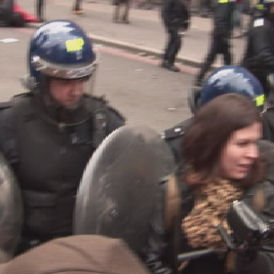Kettling of G20 protests ‘not lawful’
Police tactics used against climate camp protesters at the G20 protests in 2009 were “not lawful”, the High Court rules. A filmmaker recalls the “traumatic” events at the protest for Channel 4 News.

Police may have to re-think their tactics for controlling large protests, including the controversial “kettling” method, as a result of the judgement. While it only covered the specific incident, it could have implications, experts said.
Two climate change campaigners, Hannah McClure and Josh Moos, brought the case to the High Court against the Met Police. Their case challenged the legality of the “violent” restraint methods used against them at the Camp for Climate Action in Bishopsgate on 1 April 2009 during the wider G20 protests.
At 7.07pm, after a day of mainly peaceful protest and Climate Camp occupation at this location, police formed a line and “kettled” the group in Bishopsgate. In the case, the High Court heard that officers used punches to the face, slaps and shields against demonstrators who police bosses accept had nothing to do with violence.
The High Court has now ruled that this was “not lawful” at this time, although the judgement does say that the temporary containment methods became justified later that evening. Two judges also said they were “not persuaded” that a “pushing operation against a 15-person deep crowd” was “reasonably necessary”.
‘Condemned’
The demonstrators were represented by John Halford, of Bindmans solicitors, who said the court had “roundly condemned” the police actions.
He added: “To date, there have been few signs of a change in police attitudes and tactics since G20. This judgment could not give a clearer signal that that must happen immediately.”
Responding to the judgement, the Met Police said it would appeal the finding.
- Chapters
- descriptions off, selected
- subtitles off, selected
- captions settings, opens captions settings dialog
- captions off, selected
This is a modal window.
This is a modal window. This modal can be closed by pressing the Escape key or activating the close button.
In a statement, the Met Police said: “We have rigorously defended the claims against the MPS because at the heart of this case lies a vital public order policing tactic that prevents disorder and protects the public.
“It should be noted that the judgment relates to the individual circumstances of 1 April 2009 and not the use of containment at other events. Where necessary we will continue to use containment as a last resort to prevent serious disorder and violence.
“However, we believe that this issue is so important for the police’s ability to prevent disorder within protest that we will be appealing the Administrative Court’s finding that the containment and pushing operations on the 1 April 2009 in Bishopsgate were not lawful.”
The case centres on action which took place on the same day that newspaper seller Ian Tomlinson died after being struck by a police officer at a separate G20 protest at the nearby Royal Exchange. An inquest is currently looking into the circumstances of his death.
'Traumatic'
Emily James is an independent filmmaker who was at the G20 protests in 2009. She has made a film about direct action, including footage from the protests which was used as evidence in the case and you can watch above, called Just Do It: A Tale of Modern Day Outlaws, which comes out in June.
She told Channel 4 News: "Nobody who was there would have had any reason to expect that the police were about to come in wielding truncheons in the way they did.
"At the G20 there were a lot of people who had been in this situation before - but also some others who had come down in the afternoon when it was calm - for them I think it was a really traumatic experience, as well as for some of the more seasoned people."
She said that the ruling had the potential to change police tactics.
"I think all these things are going to be tested over the next year or two, as we have every reason to believe that street protests are going to continue in the current climate. Police have a challenge ahead of them to see how they can act appropriately."